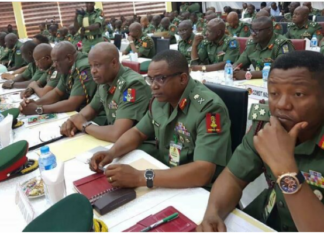By Ishaya Ibrahim
A back and forth between the Villa and the National Assembly (NASS) delayed President Muhammadu Buhari’s assent to the 2016 budget until Friday, May 6, causing hiccups everywhere, as federal spending is the lifeline of the economy.
Lagos Chamber of Commerce and Industry (LCCI) Director General, Muda Yusuf, lamented that the delay entrenched the cycle of poor budget implementation.
“Definitely, continued delay would affect implementation, especially the capital component of the budget. The risk is that recurrent spending will be fully implemented while capital projects suffer the usual implementation shortfall,” he said.
Implications of delay
He stressed that the delay has implications for both the public and private sectors, because “strategic planning for many organisations takes a cue from the budget structure and the policies that come with it.
“To the extent that the budget is not in place, uncertainty and associated business risks in the economy are heightened.”
Going forward, however, he advocated better communication between the NASS and the executive.
“They need to be on the same page with regard to the fundamental principles of the budget. The ruling party has a role to play in this matter, especially when it has the majority in the legislature.
“It seems also necessary to clearly define the boundaries of responsibilities between the executive and the legislature in budgetary appropriations to avoid this recurring problem of delay. A judicial pronouncement is necessary to lay the matter to rest.”
Bad economic planning
Former Director of Corporate Affairs, Manufacturers Association of Nigeria (MAN), Rasheed Adegbenro, said bad planning makes the whole economy to rest on the government “simply because the government is the largest single spender and government is the largest single earner.
“Because the government is the largest single spender, the rest of the economy wants to wait and see how much it is putting into the economy and in what direction.
“And since our economic structure is more of trading and services, the larger economy will rest on the government to see where spending will go in a year.”
Adegbenro explained that the delay may not have really affected manufacturing but consumers and buyers since the money in their pocket is what determines how far production goes.
He said manufacturing may be affected because it does not have control over monetary and fiscal policies.
“Monetary policy will give you a picture of what the forex (foreign exchange) calculation for the year will be – the benchmark dollar to naira policy.
“Manufacturers will need that for their own internal planning because most of them import raw materials from overseas. So the ruling rate of the dollar is a major factor in their forex calculation. That is about the monetary policy.
“Fiscal policy is also at the full control of the government. This is what determines what duties you are going to pay and what machinery you are bringing in or what duty you are going to pay for bringing in a particular material.
“So monetary and fiscal policy measures usually give directions to industries, how their planning should go.”
Job creation
In terms of jobs, Adegbenro said government spending will show whether there will be expansion in the economy or contraction.
“If there will be contraction, most of the contractors working for the government will first lay off unneeded labour. Same with those in trading.
“If the economy contracts that means there will be less money in the pockets of people and that means consumable purchase may also drop. And this may inform manufacturers to drop down their capacity utilisation.
“If the contraction is very heavy, a lot of workers might have to go. But if it is marginal, industries can still sustain particularly trained hands by keeping them for longer period.
“In the areas where you expect policy to show direction concerning job expansion is where there is a shift from recurrent heavy spending to capital projects.
“Capital projects will entail construction of new hospitals, roads and others; and naturally these things bring up new labour.
“But if there is contraction in the budget, like in the last few years we’ve been having more spending of the budget on recurrent expenditure – just paying salary and maintenance services – it’s never good for any economy.
NASS on overdrive
Tunde Oseni, a lecturer in political science and international relations at Lead City University Ibadan, argued that the NASS went overboard by tinkering with the budget.
Said he: “The budget process begins from the executive. It is supposed to be vetted by the legislature which is the recognised body representing the Nigerian people.
“It will then be given back to the executive for assent, to say that what I have given to you is what you are giving back to me.”
He said Buhari realised that his budget was tampered with, and protested on April 21 that he was not going to sign it.
“The legislature is only constitutionally empowered to vet budget.
“If the legislature has the power to tinker with the budget, it therefore means that the executive has no power to make the budget in the first instance, because the executive could have made a budget and said, ‘I want to spend N1 billion this financial year’, and the legislature could say, ‘no, spend N1.5 billion’.
“That removes the power of the executive to make the budget.”
Oseni recalled that because the PDP had dominated the legislature since 1999 there had never been any conflict over budget padding.
“This president seems to be a more thorough person. He believes that if he should assent his signature to the budget as given to him by the legislature, he may be committing some errors.
“He doesn’t want to sign something that will not satisfy the yearnings of Nigerians as promised during the campaign.”
He said even if the legislature wanted to suggest some areas which it thinks should be funded, it should be in form of addendum, achieved through meetings and deliberations with the executive.
“Not for the executive to propose A, and the legislature is returning A plus. That will rob the executive of the power to make the budget.”













